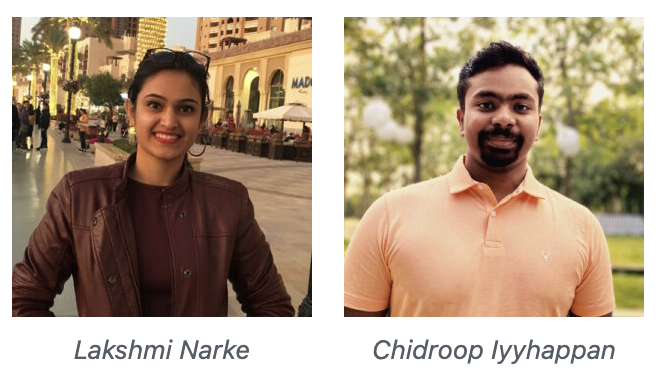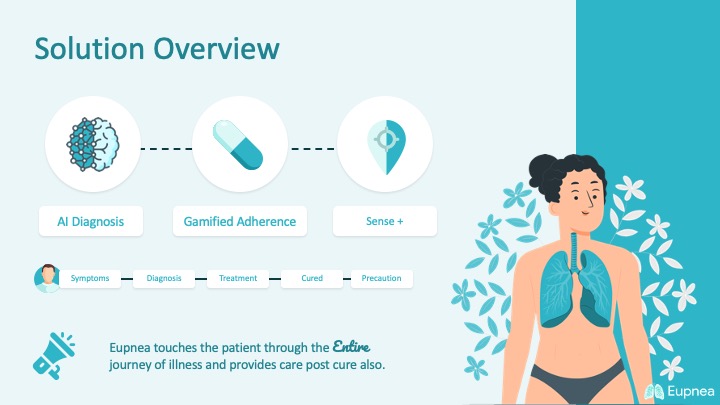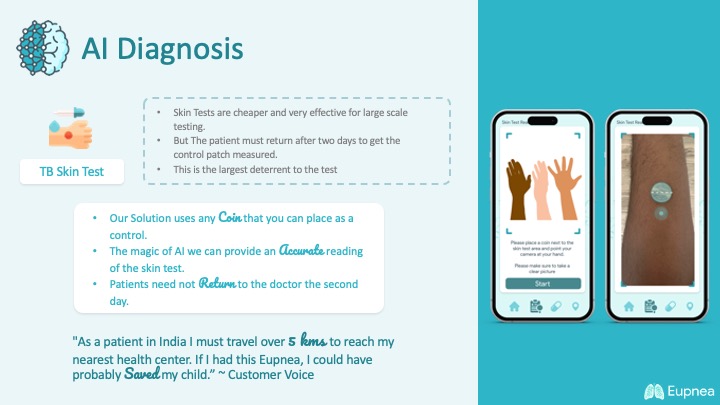Back-to-Back Wins Send ICS Grad Students to Microsoft Imagine Cup World Championship

UC Irvine graduate students Lakshmi Narke and Chidroop Iyyhappan can rattle off all kinds of statistics about tuberculosis. For example, they’ll tell you that more than 10 million people fell ill from TB in 2021, including 1.2 million children. They’ll stress the 1.6 million lives lost to TB that year, making it the second deadliest infectious disease.
Why do Narke and Iyyhappan, who are earning their master’s degrees in computer science from the Donald Bren School of Information and Computer Sciences (ICS), know so much about TB? Because in collaboration with Aditya Sreerama, an engineering management graduate student at Duke University, they’re developing a low-cost solution to eradicate TB using artificial intelligence and gamification.
Their innovative tech platform, Eupnea, won Microsoft’s 2023 Imagine Cup Epic Challenge in January, sending them straight to the World Finals. After their top-place finish for the American region in March, the trio of students are now headed to the World Championship.
“We were thrilled to have won the healthcare category prize,” says Iyyhappan, “and are so proud to represent UCI and ICS on the world stage.”
The Imagine Cup
Microsoft has been hosting the global Imagine Cup technology competition since 2003, with thousands of teams presenting technology they’ve developed to address real-world problems. Over six to eight months, the competition whittles the number of participants down to 48 finalists: 16 teams from the American Region, 16 from Asian and 16 from EMEA (Europe, Middle East and Africa).
Eupnea, selected as the top team for the American Region, won $5,000 and is now one of the final three teams — one from each region — competing for the grand prize of $100,000 and a mentoring session with Microsoft Chairman and CEO Satya Nadella.
The Eupnea Platform
The spark for Eupnea started at the RV College of Engineering in India, where Narke, Iyyhappan and Sreerama all first met while earning their undergraduate degrees. “So that’s how we know each other,” says Narke. More than one-quarter of global TB cases are in India, where TB detection is often unavailable or too costly. So the students wanted to develop a low-cost solution for effectively diagnosing and treating TB and garnering community support.
“We reconnected [here in the U.S.] and thought the Microsoft Imagine Cup would be a great platform to bring our idea to our fruition,” says Narke. Their idea, the Eupnea mobile and web-based application, leverages AI to diagnose TB and incentivizes treatment adherence through gamification.

The app starts with a two-step diagnostic process. “Let’s say you’re had a persistent cough for a few days,” explains Narke. “Just pick up your phone, record the cough for a couple of seconds, enter details such as other symptoms, and then the system is intelligent enough to give you a risk score.” Users who receive a “high risk” notification are advised to visit a doctor for a TB skin test.
Typically, after that first doctor’s visit, patients have to return to the doctor’s office within 48 hours to have their skin test read. However, with Eupnea, users place a coin next to where the test was administered and then take a photo. “The computer vision model is intelligent enough to pick up the coin and skin test and create a measurement,” says Narke, “which gets sent over to your doctor, who then reviews the results and takes the next steps.”

The app also offers a two-step approach to treatment support, starting with medication adherence. This is critical, as treatment usually spans anywhere from six to nine months. “A month into the medication, you feel fine,” says Narke. “You don’t have the chest pain anymore. You don’t have that persistent cough or the night sweats. So what happens is a lot of people just stop taking the medication after a month, but once you stop the medication, the chances of relapse increases.” If a patient relapses, the same treatment is no longer available because the patient has become “multiple drug resistant.”
“So with gamified adherence, we’re basically incentivizing the patient to continue taking the medication,” says Narke. Users get coins through the app that can later be redeemed for coupons from retail stores and restaurants.
The second part of the treatment approach focuses on building awareness and community support. “There’s a lot of stigma around TB, which is why we built in a community support system,” says Narke. Users can use the app to anonymously talk to other people and connect with counselors throughout their journey. “And it need not be only for TB. It’s for any kind of disease where your mental health is taking a toll.”
The students have been fine-tuning their system, applying the machine learning and data mining skills they’ve learned in ICS, and getting tips on their pitch from the staff at UCI’s ANTrepreneur Center. The Imagine Cup Champions will be announced during the Microsoft Build event taking place May 23–24.
“It’s been daunting, but we’re super proud about the fact that, out of the thousands of teams, we’re in the finals,” says Iyyhappan. “Winning the Microsoft Imagine Cup World Finals was a great moment for us, and we love that we’re representing UCI.”
— Shani Murray